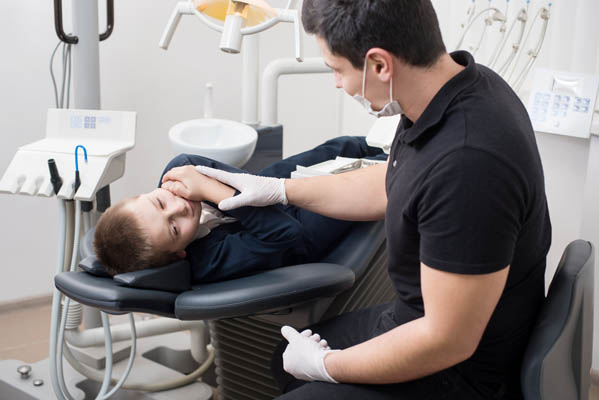When Seeing an Emergency Pediatric Dentist is Recommended

You may know that bringing your child to the dentist twice a year is important, but you may be less sure about when to see an emergency pediatric dentist. Some dental complaints may be able to wait to be treated, but certain symptoms and signs indicate that emergency treatment is necessary.
When to contact an emergency pediatric dentist
There are certain instances in which urgent dental care should be sought. If your child is experiencing any of the following symptoms, you should not wait for treatment.
Broken tooth
A tooth can break from a variety of activities, especially sports. If this occurs, you should gather the pieces of the tooth to bring along to the emergency pediatric dentist appointment. To protect the rest of the mouth, cover the edges of the remaining tooth with wax.
Cracked tooth
A tooth may have a crack but not be completely broken. A crack may not seem like a major deal, but it allows sugar and pieces of food to accumulate, which can quickly lead to tooth decay. You should especially seek emergency treatment if the crack is vertical or diagonal, as this can affect the tooth's root, which can be very painful.
Severe pain and pressure
A minor toothache that comes and goes can probably wait for a regular appointment. However, if your child complains of severe tooth pain, you should seek emergency dental treatment. This is especially true if the child is complaining of accompanying ear pain or pressure.
Knocked-out tooth
If a tooth is completely knocked out, it is important to get to a pediatric dentist as quickly as possible. With an older child, you can clean the tooth with warm water and then place it back inside the socket on the way to the appointment.
Loose or lost fillings
A filling may become loose or even come out entirely. If this occurs, you should see an emergency pediatric dentist get it replaced.
Orthodontic pain
If your child wears braces, there is commonly some pain and discomfort, especially after the wires are recently tightened. However, emergency treatment should be sought if the wires break or if there is unusual pain.
Dental abscess
A dental abscess is a sign of an infection inside the root of the tooth. Signs include swollen, red, or pussy gums, sharp pain, fever, and bad breath or a bad taste in the mouth. Emergency care is necessary to prevent the infection from spreading.
Conclusion
Numerous dental issues should not be ignored. If your child experiences any of these signs, you should see an emergency pediatric dentist as soon as possible. If your child has uncontrolled bleeding in the mouth; severe swelling and pain of the face; or an abrupt and painful injury to the jaw, teeth, or face, you should visit an emergency room or call 911 right away.
You should have dental issues treated as soon as possible, and some conditions warrant seeing an emergency pediatric dentist. If your child needs to be treated, give our office a call right away.
Check out what others are saying about our dental services on Yelp: Pediatric Dentist in Cape Girardeau, MO.
Related Posts
Though rewarding, parenting is often difficult. One of the most difficult aspects of parenting that you will encounter early in your child’s life is teething. Fortunately, a pediatric dentistry professional can help you understand what to expect and, more importantly, give you advice on how to ease your child’s pain during this challenging time in…
Pediatric dentistry focuses on diagnosing, preventing, and treating oral health concerns in children who still have their baby teeth. This review closely examines what parents and the pediatric dentistry team can do to protect baby teeth from cavities, dental trauma, and other forms of damage.Caring for baby teeth should involve brushing and flossing regularly, limiting…
Childhood cavities are a common occurrence, affecting as many as one in two children who still have baby teeth. Pediatric dentistry professionals across the globe strive to reduce the incidence rates of childhood caries and lay the foundation for better oral health for future generations. You, as a parent, can do your part by scheduling…
One of the primary goals of pediatric dentistry is to prevent oral health concerns rather than only dealing with them if they develop. In addition to educational services to help parents care for their child's teeth between visits, pediatric dentists offer preventive dental treatments that help reduce the risk of cavities, gum disease, and other…
